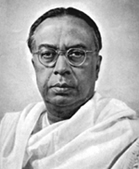Draft:Kiran Sankar Roy
| Submission declined on 12 May 2024 by Iwaqarhashmi (talk). This submission is not adequately supported by reliable sources. Reliable sources are required so that information can be verified. If you need help with referencing, please see Referencing for beginners and Citing sources.
Where to get help
How to improve a draft
You can also browse Wikipedia:Featured articles and Wikipedia:Good articles to find examples of Wikipedia's best writing on topics similar to your proposed article. Improving your odds of a speedy review To improve your odds of a faster review, tag your draft with relevant WikiProject tags using the button below. This will let reviewers know a new draft has been submitted in their area of interest. For instance, if you wrote about a female astronomer, you would want to add the Biography, Astronomy, and Women scientists tags. Editor resources
|  |
Kiran Sankar Roy কিরণ শংকর রায় | |
|---|---|
 | |
| Born | 25 October 1891 |
| Died | 20th February 1949 |
| Alma mater | University of Oxford Lincolns Inn (did not complete) |
| Occupation(s) | Politician, freedom fighter, Academic |
| Known for | United Bengal Proposal |
| Political party | Indian National Congress |
| Parent | Harishankar Roy (father) |
| Relatives | Kumar Sankar Ray (cousin) |
Kiran Sankar Roy (25 October 1891 – 20 February 1949) was an Indian Bengali politician, academic, and independence activist. He is most well known for his role in the failed United Bengal scheme of 1947 and his association with the Bose Brothers.
Birth and education[edit]
Kiran Shankar Roy was born on 25 October 1891 to a Zamindar family of Teota village in the Dhaka district of Bengal.[1] Kiran Shankar did his early education at the village school, Teota Academy. Later, he studied at Hindu School and St. Xavier's College, Kolkata. He went to England in 1909 for higher education and studied History at New College, Oxford. He returned home in 1914 and taught history at Presidency College and Sanskrit College.[1] However, due to his protesting of the Rowlatt Act, he resigned and went to England again in 1919 to study law at Lincolns Inn.[1] He returned to India and joined the Indian National Congress in 1921. He became the Vice-Principal of the National College (Calcutta Vidyapith) and Professor of English Literature. Subhas Chandra Bose was the principal at that time. Later, he became the Vice-Chancellor of the National University.[1]
Political activities[edit]
Kiran Shankar had participated in Gandhi's non-cooperation movement. But in 1922, when the non-cooperation movement was withdrawn and the Alternative Swarajya Party was formed under the leadership of Motilal Nehru and Chittaranjan Das, he was one of the five main members of the party. In 1923 he became the party's secretary. In 1929, he was arrested and imprisoned in the Civil Disobedience Movement. He rejoined the Indian National Congress in 1933 and was elected to the Bengal Legislative Assembly as a member of the Congress. He worked as a colleague of Subhas Chandra Bose and later became the secretary of the Ad Hoc Congress Committee. Like Sarat Chandra Bose, he was vehemently opposed to the partition of Bengal and was naturally a supporter of the Provincial Coalition Party led by Sarat Chandra Bose. Kiran Shankar supported Sarat Bose's United Bengal Plan, which was inturn supported by Huseyn Shaheed Suhrawardy and Abul Hashim. However, the United Bengal scheme failed given it had no mass support among Hindus and Muslims in Bengal. After independence, he also became the leader of the Congress party in the East Pakistan Assembly. But he returned to India in 1948 and took over as Home Minister in the cabinet of the Government of West Bengal led by Bidhan Chandra Roy. He died on 20 February 1949.[1]
Kiran Shankar Ray was fond of literature. He was a prominent member of Sabujpatra Patrika edited by Pramoth Chowdhury and Monde Club by Sukumar Roy. His articles and short stories were regularly published in 'Sabujpatra', 'Prabasi' and 'Atmashakti'. They were highly appreciated in the reading community. The stories published in 'Sabujpatra' were later published in book form as Saptaparno.
References[edit]
Further Reading[edit]
- Joya Chatterji (2002). Bengal Divided: Hindu Communalism and Partition, 1932-1947. Cambridge University Press. p. 101. ISBN 978-0-521-52328-8
- Rashid, Harun-or-. "The Foreshadowing of Bangladesh: Bengal Muslim League and Muslim Politics, 1906–1947", Dhaka 2003.
- Sen, Shia, Muslim Politics in Bengal 1937-1947 (Delhi, 1976)
- Gordon, Leonard A., ‘Divided Bengal: Problems of Nationalism and Identity in the 1947 Partition’, Journal of Commonwealth and Comparative Politics, 16 (1978), 136–168.
